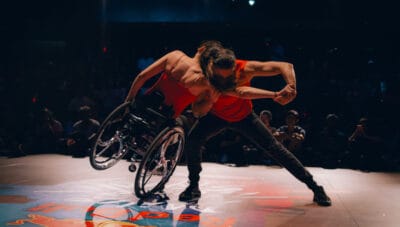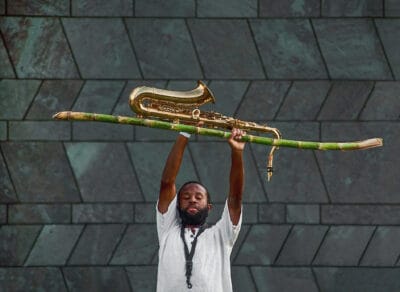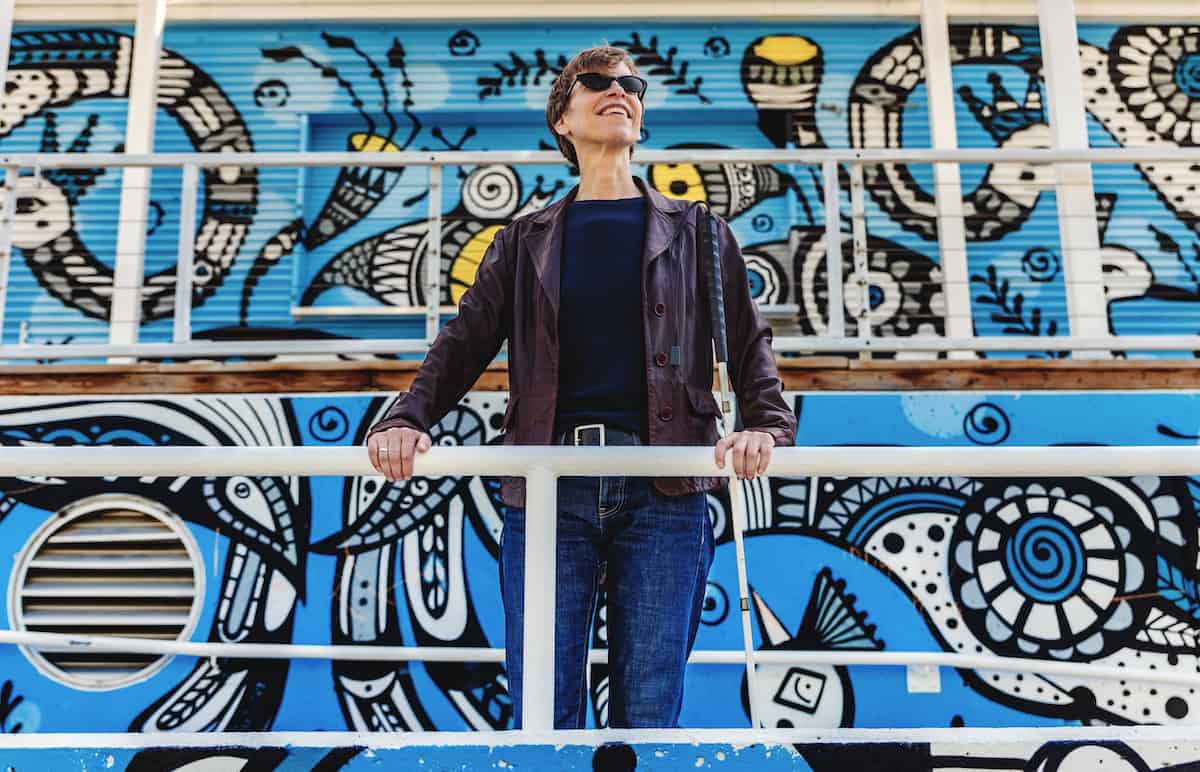One of the country’s largest arts festivals showcasing Deaf and disabled artists arrives at Toronto Harbourfront today. From April 20 to May 1, Harbourfront Centre’s CoMotion Festival will feature a range of in-person and virtual programming from more than 50 artists across 8 countries.
CoMotion is curated by Canadian playwright, actor and disability arts advocate Alex Bulmer. As part of their commitment to including disabled artists in their programming, Harbourfront Centre established the idea for the CoMotion Festival and appointed Bulmer as the lead curator.
“I’m so proud of the depth and the diversity of this festival,” said Bulmer. “Everybody’s bringing something unique, but they’re all feeding into that central curatorial ambition to reveal artists who are creating great art and centering their disability into the art.” The festival offers a vibrant selection of visual art, music, performances, digital art, workshops and panel discussions — all shaped by the artists’ lived experiences with disabilities.

Two members of Infinite Flow during their performance at Red Bull Dance Your Style in Washington, DC on July 20.
The work of disabled artists in Canada and internationally often goes unrecognized, or artists may face additional barriers. A 2018 report from Tangled Arts found 72% of the Canadian Deaf, disabled or mad artists surveyed experienced barriers to arts funding.
Bulmer lost her vision in her early 20s, while studying performing arts at X University. “I was no longer able to look down at a script, find the line, look up again, find the actor. And that was I think a pivotal moment for me,” she said. “At that point, the difficulties were starting to prevent me from doing what I wanted to do.”
Bulmer recalls how difficult this time was, as she grappled with how she could continue her career in the arts as a blind person. “Students and all my teachers noticed that I was just like no longer in my body,” she said.
Bulmer decided to leave university and attend a school in England for their voice program, hoping it would allow her to stay connected to theatre. She recalls a life-changing week she spent as a voice teacher for a youth theatre program in England that completely changed the way she thought about her disability and career going forward.
“That week with them reversed all my negative attitudes to this idea that blindness was going to rob me of my creativity or take away my opportunities in the arts. I realized it was going to be the opposite — that blindness was going to direct me through the rest of my artistic life.”
Throughout her career, Bulmer has received her share of ignorant assumptions about being a disabled artist — even from her own doctors. “When I said I wanted to be in theatre, they said ‘nobody wants to see a blind woman tripping across the stage,’” Bulmer said.
She explains how many view disabled peoples’ bodies or ways of life as a compromise, when in fact, it’s the opposite. “This is what I love about disability art. It’s art that is informed and elevated by the experiences of disability.”
Additionally, while there is a need for care and accommodation, Bulmer notes how disabled artists are sometimes treated too preciously, or encounter people who are overly concerned about their safety. “Being creative is a risk,” she said. “We are capable of taking risks. We’re not made of cotton balls.”
The art at the CoMotion festival challenges these assumptions about disabled artists, and its name was carefully chosen to reflect this and the other core values that Deaf and disabled artists cherish.
“I wanted a title that captured the idea that Deaf and disability arts disrupt expectations, often. And that is demonstrated by so many of the artists that are part of this festival.” The “Co” in CoMotion encapsulates the value of interdependence, which Bulmer describes as “a pride and a celebration that disabled people need to work collectively.”
Bulmer’s curatorial process for the festival took place during the pandemic, but the distance didn’t prevent her from connecting with the artists involved.
One of these artists is JJJJJerome Ellis, opening the festival tonight with a performance called The Clearing. In addition to the diversity of genres and themes in his art, Bulmer appreciates how Ellis’ artist name and performance draw inspiration from his experience with having a stutter, and having long periods of time where he can’t speak. “There’s these long periods of silence, a long pause. And he refers to that moment as a clearing,” Bulmer said. “It’s an opportunity for an audience to just sit inside of that and breathe and think and reflect.”

The Clearing (image of Jerome Ellis) – Credit Cameron Kelly McLeod, courtesy of ISSUE Project Room (3)
Ellis’ show will be a relaxed performance, and will offer ASL interpretation and live audio description. Other programs at the festival will be wheelchair accessible and offer braille or captioning. By providing several accessibility features, CoMotion hopes to expand the definition of what it means to be accessible. To promote financial accessibility, ticketed events have a “pay what you wish” option, and many are free.
“Accessibility and inclusion are hugely important and they are entry points,” Bulmer said. “But I really look forward to conversations that go well beyond those points of entry to points of diversity, belonging, contribution, artistry and culture.”
CoMotion’s rich selection of art and performance pieces is sure to cultivate a meaningful experience for attendees, whether virtual or in person. We appreciate their commitment to creating a safe and welcoming space for all.
“I think it will l push us forward in how we talk about the art and how disabled people think of themselves as part of the larger fabric of Canadian culture,” said Bulmer. “Because we are.”
CoMotion Festival takes place April 20-May 1 at Toronto Harbourfront and virtually. Check out the full list of CoMotion festival programming.




 Follow Us On Instagram
Follow Us On Instagram
